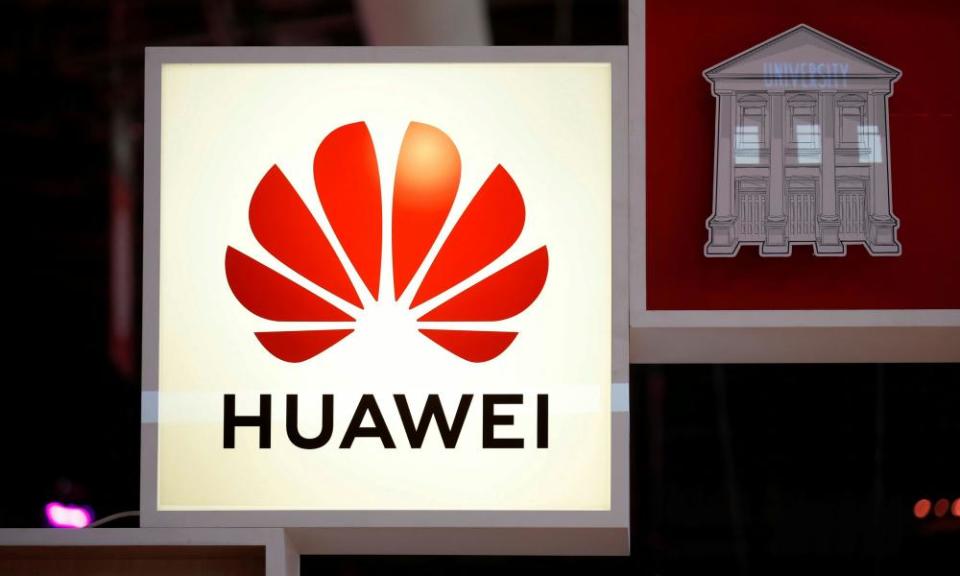Europe divided on Huawei as US pressure to drop company grows

Robert O’Brien, the US national security adviser, will meet his counterparts from France, Italy, the UK and Germany in Paris this week to urge European nations to debar the Chinese technology company Huawei from Europe’s 5G networks.
The meetings, over three days, underline how most European governments are facing similar choices to the UK, which will announce on Tuesday its decision on the company, on how far and quickly to exclude Huawei, and with what consequences in terms of potential Chinese reprisals.
The US secretary of state, Mike Pompeo, last month claimed there had been a transatlantic awakening to the threat posed by China. “Huawei’s deals with telecommunications operators around the world are evaporating, because countries are only allowing trusted vendors in their 5G networks”, he said.
France has said it will not ban Huawei equipment outright from the country’s 5G network but is encouraging operators not to use it and granting only temporary authorisations of up to eight years to those companies that already do – SFR and Bouygues Telecom.
“What I can say is that there won’t be a total ban,” Guillaume Poupard, the head of the French cybersecurity agency ANSSI, said last week. “But for operators that are not currently using Huawei, we are them not to go for it.”
Poupard said the decision was “not Huawei-bashing, or anti-Chinese racism. All we’re saying is that the risk is not the same with European suppliers as with non-Europeans.”
The finance minister, Bruno Le Maire, has said Paris is aiming to keep the Chinese manufacturer out of the country’s core mobile network, which processes sensitive information such as customers’ personal data. The state-controlled network Orange has already chosen Huawei’s European rivals Nokia and Ericsson.
In Germany the government is still divided over Huawei, with some members wanting to exclude it altogether for 5G. Parliament is now in recess, so no decision on what IT security rules Huawei would have to follow in Germany is likely until after the break.
In February, Angela Merkel resisted pressure for her party, the CDU, to adopt a policy of removing Huawei from the new network, but the Greens and some in her own party, such as the chair of the foreign affairs committee, Norbert Röttgen, are saying Germany has to realise the security risk.
In Spain the national intelligence service certified the software as safe and compliant with the relative legislation last month. Telefónica’s existing 4G technology in Spain depends entirely on Huawei equipment so Telefónica will continue to have Huawei technology in what is known as its 5G core – where the most sensitive information is stored – for now and in its so-called periphery, which consists of masts, antennas and passive equipment.
In central and eastern Europe, the US has had some success at pushing for a tough line in countries strongly reliant on Nato military protection. Romania, Poland, the Czech Republic, Latvia and Estonia have all signed joint statements with Washington on 5G security, pledging that the countries will not allow access to their markets to companies subject to foreign state interference. Last year, Poland arrested a Huawei employee in Warsaw on spying charges, and called for the EU and Nato to develop a joint stance on Huawei.
In Hungary, where the prime minister, Viktor Orbán, has built friendly relations with China, the government said last November that it had not seen any evidence that Huawei equipment would pose a security threat, and has said it will include the company in its 5G rollout.
In Scandinavia, Tele2, the leading telecommunication company in Sweden, is building its 5G network with Huawei equipment. “We have used Huawei’s equipment since 4G and there have been no security problems,” said Anders Ygeman, the minister for digital development.
But TDC, the largest operator in Denmark, earlier this year chose Sweden’s Ericsson to build its 5G network after the Danish energy minister, Lars Christian Lilleholt, underlined 5G security concerns without specifically mentioning Huawei.
Two big companies, Vodafone and Eir, are using Huawei technology as they build the 5G network in Ireland. The Trump administration has lobbied Ireland as many US tech companies have operations there and so, in theory, are vulnerable. The Iriah government is trying not to say anything publicly but seems content to let Vodafone and Eir plough ahead with Huawei.
The European commission has issued guidance – it has no direct powers – suggesting EU member states avoid “high-risk” suppliers and called on governments to take a common approach.
Additional reporting by Jon Henley in Paris, Jennifer Rankin in Brussels, Philip Oltermann in Berlin, Shaun Walker in Budapest, Rory Carroll in Dublin and Sam Jones in Madrid

 Yahoo Finance
Yahoo Finance 